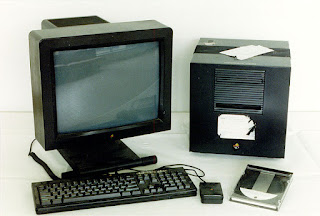NeXT, Inc. was started by Steve Jobs in 1985 after his resignation from Apple Computers, a company he founded, following an [in]famous boardroom coup. NeXT unveiled its first product, the NeXT computer, at a gala event in 1988.
Dominique was recruited by Steve Jobs to turn around NeXT, first as chief financial officer and later expanding to lead all operations. He led NeXT’s shift from hardware to software and brought the company to profitability. He successfully restructured the company financially, organizationally and strategically, and finally sold NeXT to Apple in 1997 for $462M.
NeXT was instantly recognised for its competency. McCaw Cellular, Inc., the first Mobile Telephony company, was entirely powered by NeXT computers. Major Stock markets began using NeXT computers for trading and analysis. The American intelligence agency, CIA, also preferred NeXT for dealing with highly sensitive data. The computer used by Tim Berners-Lee at CERN which became the world’s First Web Server was also.... you guessed it... it was a NeXT. But that was just about it.
The NeXT computer used by Tim Berners-Lee at CERN became the world's first web server
NeXT had a very limited commercial success. In fact, it is estimated that in totality only about 50,000 units of NeXT Computers have been sold ever. However, the company had a profound impact on the computer industry. Object-oriented programming and graphical user interfaces became more common after the 1988 release of the NeXTcube and NeXTSTEP, when other companies started to emulate NeXT's object-oriented system. In fact, the GUI used on Apple computers now is actually a descendant of the one used by NeXT. There is much to be learnt from the successes as well as failures of NeXT.
Since we were talking about a company founded over 2 decades ago, and discussing its failures and successes, Dominique started by pointing out the fact that Hindsight is indeed 20/20. This carries a bit of sarcasm in it, since it says it’s easy to be critical of an event that happened in the past. This is because one judges the wisdom of decisions made then, in the light of new information and AFTER knowing the outcome, which is unfair since that info was not available when the decisions were made. While lessons may be learnt from experiences, they are definitely not indicators of bad decision-making abilities. This is especially true for the IT industry, characterised by rapid changes and a highly dynamic environment. This can also be seen as a philosophy which asks not to look at the past with suspicion/guilt but for the sake of mere reference.
Talking about philosophy, what should actually be the philosophy of any startup, any company, any enterprise, is the focus on Customers. Anyone who as ever used an Apple product, especially an Apple computer, even once, will understand what Dominique was talking about when he emphasized Steve Jobs’ keen eye on user experience. Using a computer should not be rocket science for the user. Jobs ensured that the user was always pleased to use an Apple product. Even today, while Apple may not have a very large share in the market, Apple customers are extremely loyal to it simply because they are just too comfortable with it. I don’t remember the last time I heard a Windows user say that!
This was also emphasized when Dominique spoke about “Brand=Trust”. This is especially important for entrepreneurs. The focus should first be on developing a brilliant product, about great innovations. Once you have a product, you may advertise it all you want. But while marketing is important, no Brand image is built on a defunct product, no matter how it’s marketed. Once the product is experienced to be satisfactory by the market, the brand name goes a long way after that. Dominique also talked about Indian Entrepreneurs lacking in marketing skills. A product may have great deal of innovation in it, but it most-definitely needs to be presentable as well. Apparently, Jobs lays great stress on the aesthetic beauty of the product as well as user-end satisfaction in general.
This brought us to the topic of Steve Jobs as a leader.
(To be continued...)




No comments:
Post a Comment